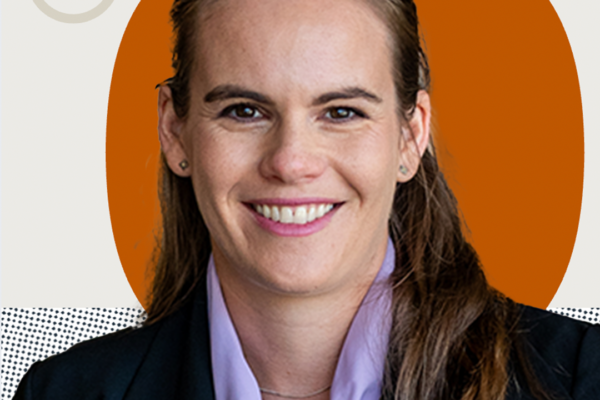Innovation and Optimism Set Stage for Growth in 2018
With high oil prices and record low unemployment, the Texas economy rebounded last year and will shift into higher gear this year. That’s according to some of the state’s most prominent business leaders. Their robust expectations are echoed by economists from the Federal Reserve Bank of Dallas, drawing from past year trends and projections based on market analysis.
By Judie Kinonen
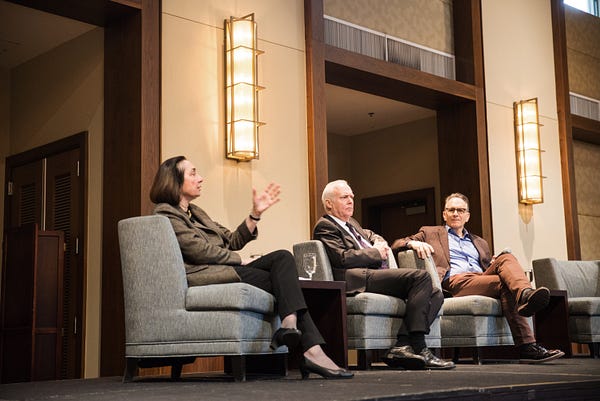
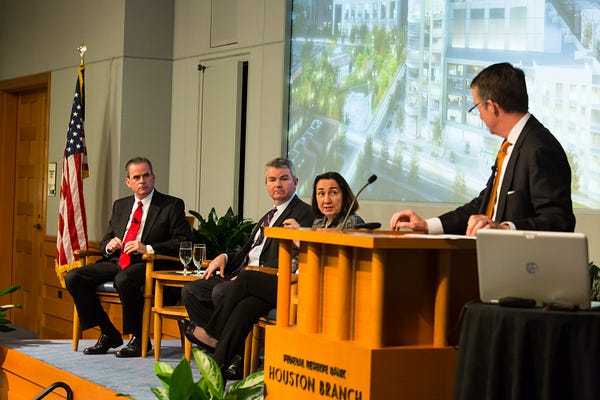
Last year Texas saw its lowest unemployment rates since 1970, and those numbers will continue to drop, with job growth of about three percent expected this year, according to economists Keith Phillips, Mine Yücel, and Robert Kaplan of the Federal Reserve Bank of Dallas. They were among experts in business and economics who offered their generally sunny predictions to audiences of alumni and business leaders at Business Forecast events organized by the McCombs School of Business in January and February in Austin, Dallas, Houston, and San Antonio.
Even Hurricane Harvey failed to dampen employment numbers in the state for long. Though the smaller coastal cities are still enduring significant workforce fallout, Houston had recovered its 23,000 lost jobs by November, mostly in construction, retail trade, and restaurants.
As for the rest of the state, “Growth is pretty broad-based across all sectors,” Yücel said.
“We’re certainly hearing a lot from businesses about the optimism with the tax plan, and that just added to growth that was already occurring,” Phillips said.
But these record low unemployment rates, coupled with an aging workforce demographic, mean that employers face a tight labor market — one that could be loosened through wise immigration policy, said Kaplan.
“We need labor,” Phillips said. “We need to rethink how we do immigration, but I think the answer is not less. I think it’s more.”
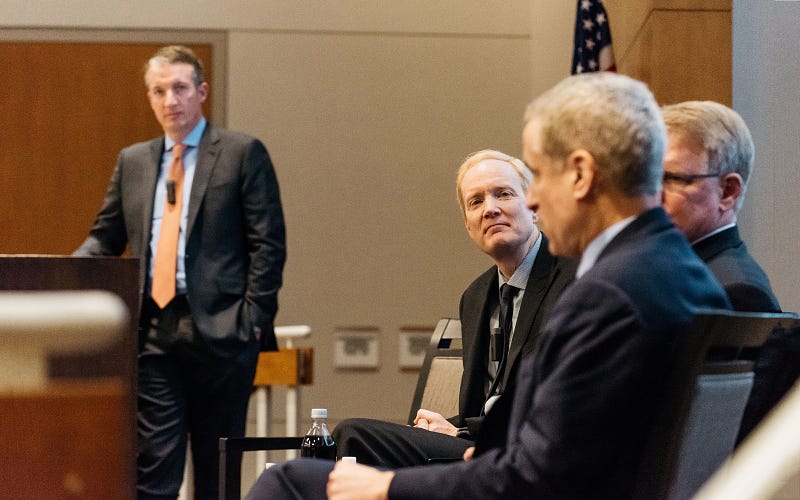
Innovation drives energy
One of the tailwinds of this growing economy is optimism, driven in large part by higher oil prices, Yücel said, noting that business leaders responding to a Dallas Fed survey hope for oil prices between $61 and $65 per barrel.
The U.S. has added four million barrels of oil per day into the market since 2008, making it a real force in the global market, with the majority of that surge coming from Texas.
This robust growth is the direct result of advances in drilling technologies, said Clay Williams, chairman, president, and CEO of National Oilwell Varco. “On average, rigs today drill four times the footage that they did back in the 1980s,” he said, crediting the downturn of the 80s and 90s with the necessity of inventing better drilling methods. And he said the industry is ripe again for innovation: Increased use of robotics, machine learning, and predictive analytics will improve safety and efficiency in the oil field.
Staggering under the weight of data
At a time when 90 percent of data has been created in the last two years, panelists noted that collecting, generating, and storing that data present unique challenges for a number of industries in the years ahead. Peter Zandan, global vice chairman for research and data insights at Hill+Knowlton, said the world is “not prepared” for the societal issues raised by the proliferation of data. “Data knows us better than we know ourselves,” he said, adding that most Americans are “digital literate, but data illiterate.”
It is data that make job disruption a real problem, Zandan said: “It’s not the robot, but what the robot knows that’s taking the job away.”
The already astounding amount of data being generated will multiply 13 times by 2025, said Stephen McGaw, senior vice president of corporate strategy and development at AT&T. He said that’s why AT&T invested $105 billion in infrastructure from 2012–2016, and that rate of investment will persist.
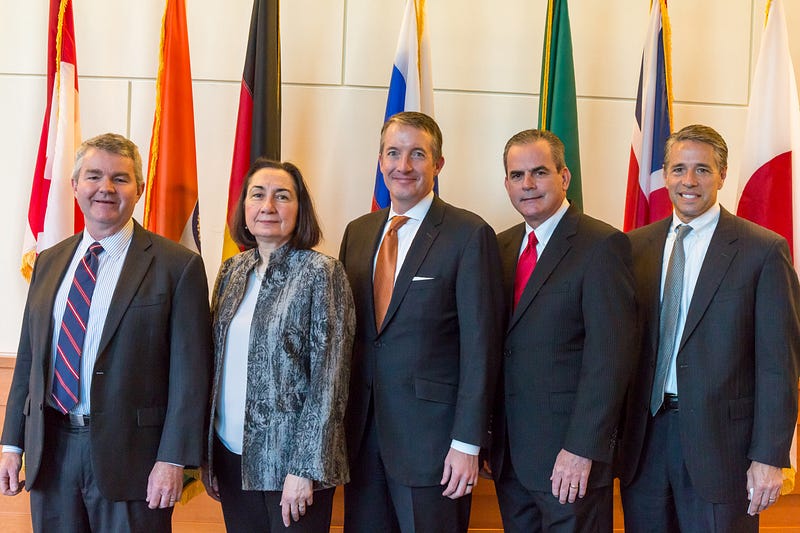
Federal Reserve Bank of Dallas.
Beefing up cyber security
“You have to do a lot of innovation around cyber security if you’re in our business,” said McGaw. In addition to developing tools to keep its own data safe, AT&T has rolled out software like Net Bond, which extends a private network into the public cloud, shielding it from internet security threats.
The prevalence of such threats cannot be overestimated, said John Dickson, principal of the Denim Group. “What’s happened now is there’s this incredible underground, an economy,” he said, noting how easy it has become in the last two years to buy the tools needed to steal information or disrupt technologies.
“It’s the equivalent of going to Amazon or downloading it,” Dickson said, adding that eminent dangers from America’s political enemies include GPS and power grid disruption.
“The reality of it is, there are two groups of folks out there: You’re the targeter or you’re a target of opportunity,” Dickson said. “If you’re a bank or financial institution, you’re under incredible assault all the time.”
Shaping the customer experience
Even traditional industries are innovating, driven by a desire to guide the customer experience, said D. Keith Oden, principal executive officer and director for Camden Property Trust. In an industry-shifting move, Camden has rolled out the first revenue management software for the multifamily industry: “We have 160 community managers each charged with the task of deciding what’s the right market clearing price for this apartment at this moment,” Oden said. “Without technology to assist them with that and drive that decision, it can’t happen.” In another industry first, Camden has implemented a round-the-clock contact center for any resident or potential resident.
These kinds of efforts to keep in touch with the customer base have never been more important, said Mike Van de Ven, COO of Southwest Airlines. “We’re really focused on information exchange and mobility of information,” he said. Southwest has invested in a Listening Center — a group charged with monitoring real time social media networks and the news.
“We’ve got to marshal our resources as soon as these emerging issues start to develop,” Van de Ven said. “They become viral very quickly, and we want to be a part of messaging that story.”
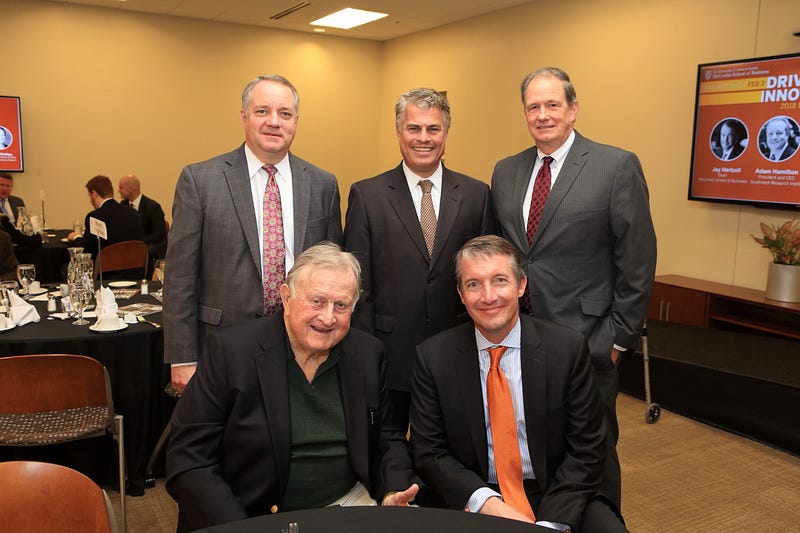
Fostering a culture of originality
The innovation required in today’s business climate can only spawn a corporate culture of shared ideas, said Adam Hamilton, president and CEO of Southwest Research Institute. “We have different technical divisions, but we can get out of those divisions and talk to other scientists, other engineers, mathematicians, statisticians, even business people and find out what’s going on in their world and be more aware of what needs to be done,” he said.
Changes in geopolitics, from closer relations between China and Russia to a nuclear North Korea, will continue to shape how business operates. Closer to home, it bears watching the future of NAFTA, said David Judson, editor-in-chief of Stratfor, a geopolitical intelligence platform that challenges traditional thinking about world events. “NAFTA, much discussed here in Texas, won’t disappear,” he said. “Negotiations will be protracted, but there’s too much at stake for it simply to be cancelled.”
These forecasts were drawn from panelists at the 2018 University of Texas McCombs Business Forecast events, held in Austin, Dallas, Houston, and San Antonio in January and February. Watch the full video for all four events at the link below.
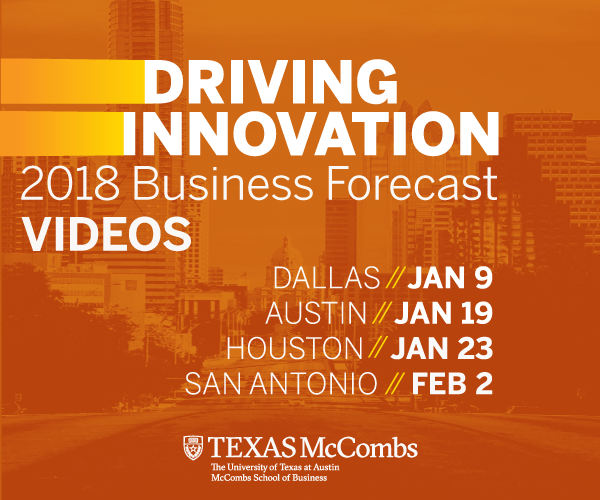
About this Post
Share:


